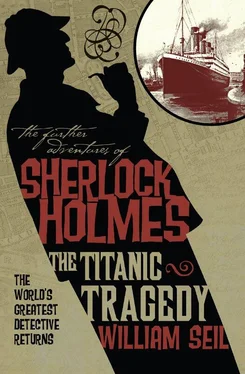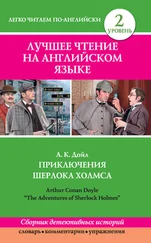‘When we find the man with a scratched face, perhaps we will obtain some answers.’
‘Well, we must find him soon, Watson. The Titanic docks in New York in six days. After that, our suspects will leave the ship and all will be lost.’
Chapter Ten

THE MORNING OF FRIDAY 12 APRIL 1912
‘Gentlemen, Miss Norton, I recognize the importance of these plans and the limited time you have to recover them. But please understand that I cannot have the passengers on this ship disturbed. You must conduct your investigation quietly, and involve as few people as possible.’
The captain, after many years in authority, had developed the ability to give orders in a diplomatic way. At sea, business leaders, government officials – any passenger on the ship – fell under his command. Yet, despite his tactful approach, he left no doubt that his orders must be obeyed.
‘But of course, Captain,’ said Holmes. ‘Rest assured, I have handled cases of far greater delicacy. Your passengers will not be disturbed.’
The four of us were walking casually along the boat deck towards the wireless room. Miss Norton had not yet sent a message to her superiors, announcing the loss of the plans. Despite the sunshine and the fresh, crisp sea air, she looked pale. This, her first major assignment, appeared to be heading towards a disastrous conclusion.
In the wireless room, both Phillips and Bride were hard at work – Phillips clicking away at the wireless key and Bride taking down messages.
‘Phillips, when you’ve finished that message, Miss Norton has an important message that must go out immediately,’ said the captain.
Phillips half nodded as he transmitted the final words printed on the sheet before him. Then he turned his chair and looked up at Miss Norton with a smile.
‘Miss Norton, what can I do for you?’ Phillips seemed disappointed when Miss Norton did not return his smile. In fact, she was most business-like.
‘I have a message to be delivered to a Mr Holmes at the Diogenes Club in London. I have written down the particulars.’ She handed Phillips a wireless form, on which she had written a brief message in pencil. Phillips looked at the message, glanced at the captain, and then returned his attention to Miss Norton.
‘Yes, madam. Right away.’
Phillips was about to send the message, but he was interrupted by the imposing voice of the commodore. ‘One moment, Mr Phillips. Do you mind if I ask you a question?’
‘Go ahead, sir.’
‘Since last night, have you been asked to transmit any messages that you would judge to be unusual?’
Phillips chuckled. ‘Funny that you should ask that, sir. Bride and I had a laugh over this one. It came in early this morning.’
Phillips flipped through sent messages he had spiked, and ripped one from the centre.
‘Here it is.’ Phillips, a gregarious young man, clearly enjoyed this opportunity to entertain visitors. ‘Listen to this, it doesn’t make any sense: “Have met the Hot Russian Honey Bear and am ready to talk business. If I am detained, meet me on board by the pipe organ in the smoking room”.’
‘Pipe organ in the smoking room! That’s nonsense!’ said the captain. ‘There’s no pipe organ on this ship. There is no organ of any kind in any of the smoking rooms.’
‘Pray, may I see that message?’ said Holmes.
Holmes examined the wireless form carefully, first reading it in detail, then observing the paper more closely through his glass.
‘There is little I can tell from this,’ he said. ‘No handwriting, all typed. Good firm key strokes... possibly a man, but I am not sure. The addressee is a Mr Basil, for pick-up at the Marconi office in New York.’
‘And the sender?’ I asked.
‘Listed as a Mr Robert Smith. That’s undoubtedly a fictitious name, but we should check it against passenger and crew lists. Captain, would you make arrangements for that?’
‘Of course. Do you suspect that this has something to do with the theft?’
‘It is very possible...’ Holmes took a blank piece of paper from Phillips’s desk and scribbled out a brief message. ‘Now, Mr Phillips, would you add these words to Miss Norton’s message and send it immediately?’
Phillips seemed puzzled that his humorous story was taken so seriously. But he followed the commodore’s instructions.
‘I hope you don’t mind my adding a postscript to your message, Miss Norton, but I suspect our friend in London would want to know about this latest development.’
‘No, of course not. Now, if you’ll excuse me, Commodore, gentlemen, I’m going to the message desk to see if I can get a description of our Mr Smith.’
‘Good. And with your permission, Captain, I have one more message to send.’ Holmes dashed out a brief note and handed it to Mr Phillips. ‘It is to an associate of my brother in the United States Navy. Perhaps he can help us to identify our Mr Basil.’
‘Very good, Commodore,’ said the captain. ‘I must leave you now for I have a ship to run... Incidentally, you wanted to accompany me on my daily inspection of the ship. We meet at 10 am on the bridge. Be there in full dress uniform. Oh, and Doctor Watson, you are invited too... Come as you are.’ An hour later, Holmes and I were on the bridge with Captain Smith. There were others there as well – the chief engineer, the purser, the assistant purser, the ship’s surgeon and the chief steward. All were in full dress uniform. The captain, wearing two medals on his dark coat, was an impressive figure, indeed.
Holmes had come well prepared for his role as Commodore Winter. He was wearing his Royal Navy dress uniform with no less than four medals – all borrowed, of course. I must admit, I felt a bit out of place in my brown tweed suit. If only I had thought to bring my old army uniform... Well, perhaps not such a good idea after all.
We moved into the captain’s quarters, where each of the officers present delivered a report, based on their inspections of their own areas an hour earlier.
At 10.30 am sharp, we began our inspection of the ship. It was a fascinating journey, taking us through corridors and facilities in first, second and third class. We walked through dining rooms, kitchens and pantries, examining them for cleanliness and, in general, they met the high standards of the White Star Line. We passed through gentlemen’s hairdressers, bakeries and lounges. Except for a few minor infractions, all was ‘shipshape’.
My assignment during this tour was to chat with doctors in each of the ship’s hospitals, asking whether anyone had come in with scratches about the face. While word of the attack on the dowager had been kept from the passengers and most of the crew, Holmes and I had the captain’s permission to conduct a discreet inquiry. Much to our disappointment, we learned nothing from the medical staff.
The inspection moved downwards into the lower decks, where we entered the great storage rooms and cargo holds. The central half of lower deck G was taken up by boiler casings and coal bunkers. This day the captain had elected not to inspect the forward end of the deck, which housed the ship’s post office, third-class berths and quarters for some of the crew. Instead, we descended into the aft section. There were a few second- and third-class cabins in this area, but our tour was limited to the complex network of storage rooms for food and kitchen supplies. The dark solitude of these dimly lit corridors was broken only by the vibrations of the engines below, and the sound of our shoes clanking against the metal floor. And it was cold, very cold, due to the remarkable efficiency of the ship’s refrigeration equipment.
Читать дальше













